.jpg)
Have you ever found yourself gazing into the mirror, wondering why your hair is such a frizzy and poofy mess? You're definitely not the only one. Taming frizzy and poofy hair can feel like an uphill battle, leaving many people exasperated. But worry not, because we're here to help you figure out what's going on and provide you with the best ways to fix it.
Let's dive into the world of frizzy hair and discover how to make your hair less poofy and more fabulous!
What Causes Frizzy Hair?
Are you wondering what makes your hair frizzy in the first place? Let's dive into the root of the problem! Frizzy hair can be caused by a variety of factors, and we've gathered the main culprits to help you understand what's going on with your locks:
Humidity
One of the primary reasons for frizzy hair is humidity. Moisture in the air can wreak havoc on your hair, causing it to swell and frizz up.
This is because the hair's outer layer, known as the cuticle, is made up of overlapping scales(1) that open up when they absorb moisture from the air. In turn, this leads to hair shaft swelling, which can cause your hair to appear poofy and frizzy.
This effect is even more pronounced in curly or wavy hair, as the hair's structure makes it more susceptible to changes in humidity.
Hair Damage
Another significant cause of frizzy hair is damage. Damaged hair is more prone to frizz due to a compromised cuticle layer. When the cuticle layer is damaged, it can't effectively seal in moisture, causing the hair to become dry, brittle, and frizzy. Factors that can lead to damaged hair include:
- Frequent heat styling (e.g., using flat irons, curling irons, or blow dryers)
- Chemical treatments (e.g., coloring, perming, or straightening)
- Over-washing or using harsh shampoos
- Environmental factors (e.g., sun exposure, chlorine in swimming pools)
- Poor hair care practices (e.g., brushing wet hair, using low-quality hair accessories)
Hair Type
Some hair types are more susceptible to frizz than others. For example, curly hair is naturally drier and more prone to frizz compared to straight hair. This is because the scalp's natural oils, which help to moisturize and protect the hair, have a harder time traveling down the hair shaft in curly hair due to its coiled structure.
Additionally, the individual strands of curly hair are typically finer and more fragile, making them more prone to damage and breakage. Wavy hair also tends to be more prone to frizz compared to straight hair, as it falls somewhere between the two in terms of structure and moisture distribution.
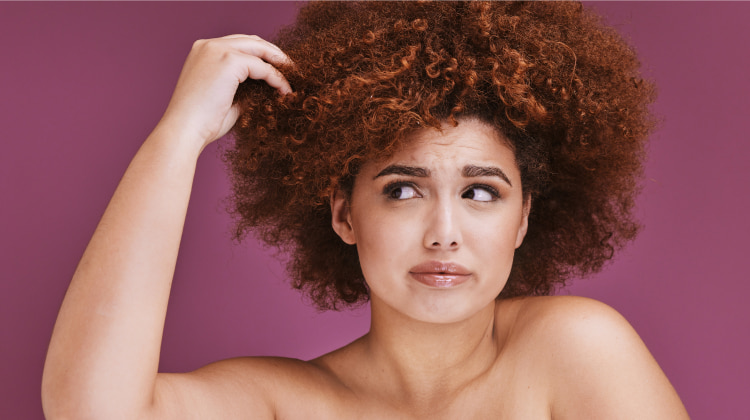
Lack Of Moisture
Dry hair is more likely to become frizzy, as it seeks to absorb moisture from the surrounding environment. When your hair is parched, it tries to absorb moisture from the air, leading to that dreaded frizz. Some factors contributing to dry hair include:
- Over-washing, which strips your hair of its natural oils
- Using hair products with harsh ingredients(2), like sulfates or alcohol
- Not using a conditioner or using one that is not suited for your hair type
- Exposure to harsh weather conditions, such as cold, dry air or strong winds
Using The Wrong Hair Products
If you're using products that are too heavy, too light, or not designed for your hair type, you might be contributing to the frizz problem. Some common product-related issues include:
- Silicone-based products can weigh down fine hair, making it appear limp and greasy
- Alcohol-based products can dry out your hair, making it more prone to frizz
- Skipping a leave-in conditioner or using one that is not suitable for your hair type can leave your hair more susceptible to frizz and breakage
- Overusing styling products, like gels or mousses, can cause product buildup, which can make your hair look dull and frizzy
Genetics
Sometimes, frizz is simply in your genes. If your parents have frizzy hair, there's a good chance you might have inherited the trait. Genetics play a significant role in determining the texture, curl pattern, and overall structure of your hair, which can affect how prone it is to frizz.
Friction
Things like rubbing your hair with a towel, using a rough pillowcase, or constantly putting your hair up in tight hairstyles can cause friction, leading to frizz and breakage. Some common sources of friction include:
- Vigorously towel-drying your hair, which can rough up the cuticle and cause frizz
- Sleeping on a rough, cotton pillowcase can create friction and tangle your hair
- Wearing tight hairstyles, like ponytails or buns, which can cause tension and breakage
How to Make Your Hair Less Frizzy & Poofy
Now that we've explored the causes of frizzy hair, let's discuss some solutions! Here are some tips and tricks on how to make your hair less frizzy and poofy:
Choose The Right Shampoo and Conditioner
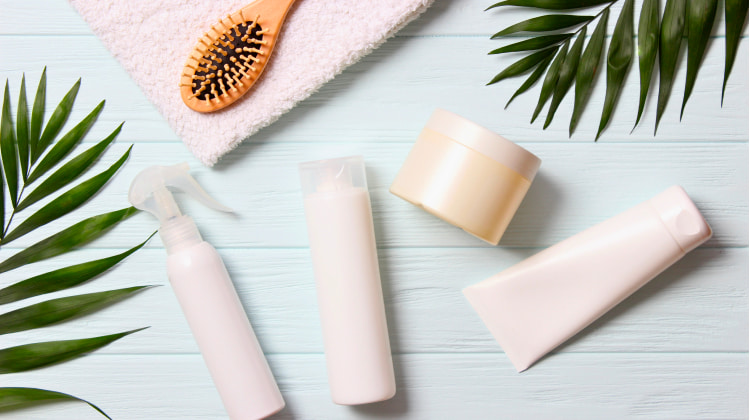
It's essential to pick hair products that cater to your specific hair type and texture. Look for shampoos and conditioners that are sulfate-free, as sulfates can strip your hair of its natural oils, leading to dryness and frizz.
Additionally, selecting products with moisturizing ingredients like glycerin, shea butter, or natural oils can help maintain your hair's moisture balance(3).
Wash Your Hair Less Frequently
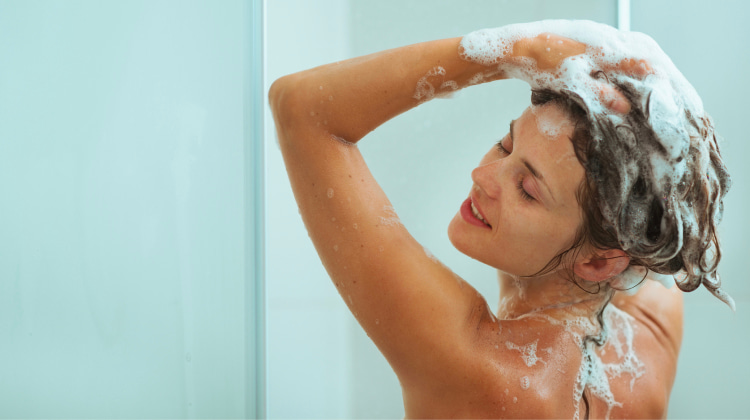
Over-washing your hair can remove its natural oils, which can cause dryness and frizz. Try washing your hair every other day or even less frequently, depending on your hair type and lifestyle.
For those with curly or textured hair, you may need to wash even less, as these hair types tend to be drier and more prone to frizz. Consider using a gentle, sulfate-free shampoo or co-washing (washing with conditioner only) for a gentler cleansing approach.
Use a Microfiber Towel or a Soft T-Shirt
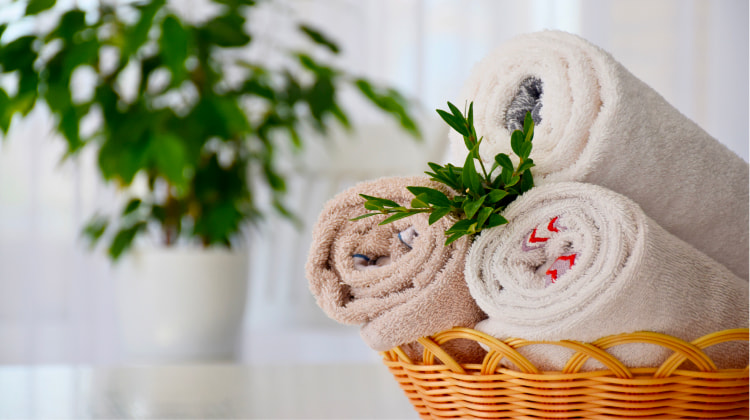
When drying your hair, avoid rubbing it with a rough cotton towel, as this can cause friction and contribute to frizz. Instead, use a microfiber towel or a soft cotton T-shirt to gently squeeze out excess water after washing.
This method can help minimize friction, reduce breakage, and keep your hair smoother. Additionally, you can try "plopping" your hair with the microfiber towel or T-shirt to help enhance your hair's natural texture and reduce frizz.
Limit Heat Styling
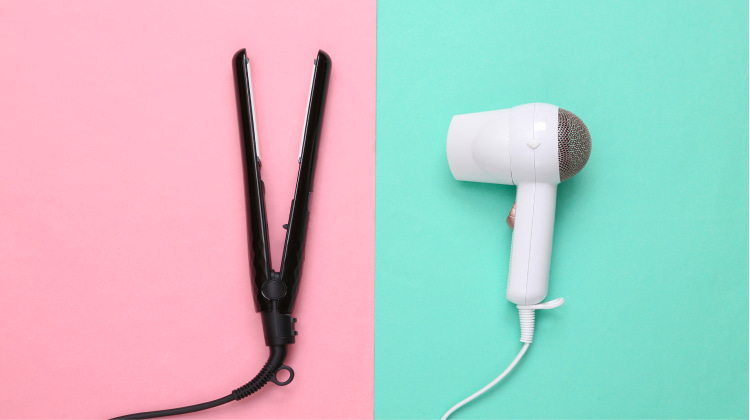
Frequent use of heat-styling tools, such as flat irons, curling irons, and blow dryers, can damage your hair's cuticle, leading to frizz. Try to limit your use of these tools, and when you must heat style, always use a heat protectant spray that forms a barrier to minimize damage.
Embrace your natural hair texture by allowing your hair to air-dry, which helps maintain your hair's moisture balance. Use heat-free styling methods like braids, twists, or buns to create different looks without causing heat-related damage.
Use The Right Hairbrush
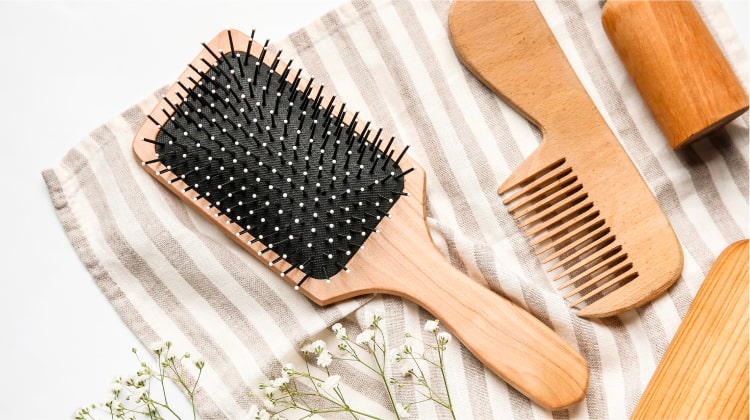
The type of hairbrush you use can impact frizz levels. For most hair types, a wide-tooth comb or brush with natural bristles (e.g., boar bristles) can help detangle and smooth your hair without causing damage or frizz.
These brushes distribute your hair's natural oils more effectively, providing a protective layer that reduces frizz. When brushing, start at the ends and work your way up to the roots, gently detangling any knots to avoid breakage and minimize frizz.
Protect Your Hair From The Elements

Exposure to sun, wind, and harsh weather conditions can take a toll on your hair, leading to dryness and frizz. When spending time outdoors, especially during sunny days, use a UV-protective spray or wear a hat to shield your hair from the sun's harmful rays.
In cold, dry weather, consider wearing a silk or satin-lined hat to reduce friction and maintain your hair's moisture balance. These measures can help prevent environmental factors from contributing to frizz and dryness.
Invest In a Silk or Satin Pillowcase

Sleeping on a silk or satin pillowcase can help reduce friction, tangles, and frizz as you toss and turn at night. Unlike cotton pillowcases, silk and satin create a smoother surface for your hair to glide over, minimizing breakage and frizz.
Additionally, silk and satin pillowcases are less absorbent, helping your hair retain its natural moisture levels and preventing dryness that may lead to frizz.
Get Regular Trims
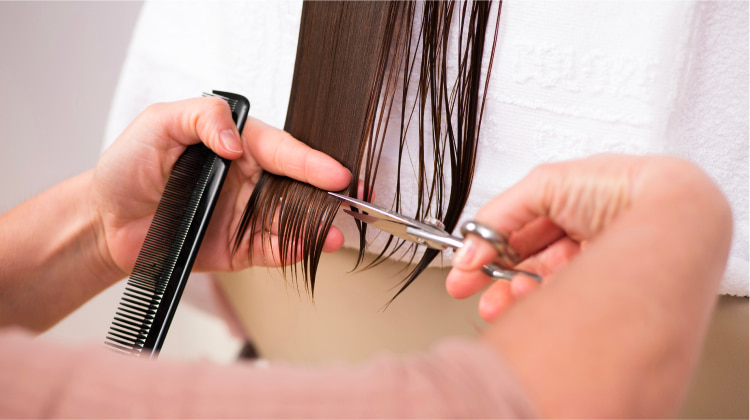
Trimming your hair regularly can help prevent split ends and keep your hair looking healthy and frizz-free. Aim for a trim every 6-8 weeks, depending on your hair type and growth rate.
Split ends and breakage can make hair appear frizzier, so maintaining a healthy hair routine with regular trims can make a significant difference in hair appearance.
Deep Condition Your Hair
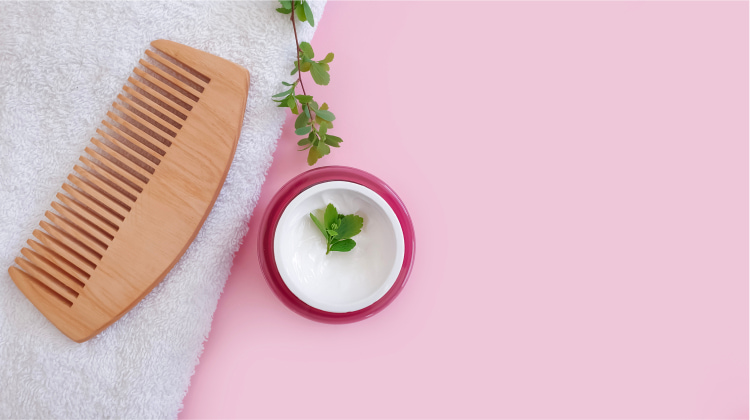
Incorporate a deep conditioning treatment into your hair care routine once a week or as needed, depending on your hair type. Deep conditioning treatments help to nourish, moisturize, and repair your hair, combating dryness and frizz.
Look for a deep conditioner with ingredients like natural oils, shea butter, or glycerin, which can provide extra hydration and help smooth the hair cuticle. Apply the treatment to clean, damp hair, focusing on the mid-lengths and ends, and leave it on for the recommended time before rinsing thoroughly.
Final Thought
In conclusion, dealing with frizzy and poofy hair can be a challenge, but understanding the causes and implementing the right hair care strategies can make all the difference.
Remember, the key is to maintain your hair's moisture balance and protect it from damage. With patience and persistence, you'll be well on your way to achieving smoother, more manageable hair. So, go ahead and show off your fabulous locks with confidence!
Frequently Asked Questions
Why is my hair so frizzy all of a sudden?
Sudden frizz can be caused by a change in humidity, hair care products, or increased heat styling. Adapt your routine and products to better suit environmental changes and hair needs.
How do you tame poofy hair naturally?
Tame poofy hair naturally by using gentle hair care products, hydrating with a leave-in conditioner, avoiding heat styling, and sleeping on a silk or satin pillowcase.
Is frizzy hair damaged?
Frizzy hair isn't always damaged, but damage can contribute to frizz. Dryness and raised cuticles cause frizz, while damaged hair may have split ends and breakage.
Should I cut my hair short if it's frizzy?
Cutting hair short isn't a guaranteed fix for frizz. Focus on proper hair care, moisturizing, and minimizing damage, regardless of hair length.
How often should you wash frizzy hair?
Washing frequency for frizzy hair depends on your hair type. Generally, wash less often (every 2-3 days) to retain natural oils and prevent dryness that can exacerbate frizz.
References
1. Yang, F.-C., Zhang, Y. and Rheinstädter, M.C. (2014). The structure of people’s hair. PeerJ, {online} 2, p.e619. doi:https://doi.org/10.7717/peerj.619.
2. Gavazzoni Dias, M.F. (2015). Hair cosmetics: An overview. International Journal of Trichology, {online} 7(1), p.2. doi:https://doi.org/10.4103/0974-7753.153450.
3. Sinclair, R.D. (2007). Healthy Hair: What Is it? Journal of Investigative Dermatology Symposium Proceedings, {online} 12(2), pp.2–5. doi:https://doi.org/10.1038/sj.jidsymp.5650046.

.jpg)
.jpg)
.jpg)
.jpg)
.jpg)
.jpg)
.jpg)
.jpg)
.jpg)
.jpg)